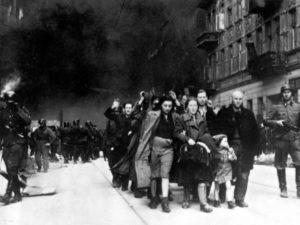The Holocaust’s Evasive History in Both Poland and Israel

Jews at one of the walls of the Warsaw Ghetto during World War II
Daniel Blatman writes in Haaretz, “For months now there has been an acrid debate over two volumes published by the Center for Holocaust Research at the Polish Academy of Sciences. “Dalej jest noc” (“Night Continues”) is the name of the project, a phrase taken from a 1942 poem by Czeslaw Milosz.”
“The two hefty volumes contain studies on provincial areas of occupied Poland and the fate of the Jews who barely escaped the deportations that condemned them to death and tried to survive thereafter, from 1942 to 1945, in Polish village society. In the introduction, the editors Barbara Engelking and Jan Grabowski, among the most important historians of the Holocaust in Poland, set forth important if partial conclusions for understanding the Shoah in that country.”
“The studies give an impressive picture of the initiatives by Jews to rescue one another. The Jews established mutual aid networks and passed along vital information about possibilities for hiding. The passive image that has clung to them is once again revealed as inaccurate. Moreover, the studies show that Jewish involvement in the rescue efforts increased the Poles’ responsiveness to helping the Jews.”
“Another conclusion of the studies is that the chance of being saved was almost entirely contingent on the society’s willingness to help a Jew. The neighbor, the acquaintance, the farmer were the narrow bridge between the Jew seeking a hiding place and the possibility of staying alive.”…

Jews being led for deportation in the Warsaw Ghetto, during the Warsaw Ghetto Uprising in 1943
“There’s a common denominator to the three volumes discussed here: the evasion of the challenge of broadening the scope of Holocaust research and anchoring it in an integrative history of the Nazi genocide and World War II. For about two generations now this kind of evasive history of the Holocaust has been written in Israel, and since 1990 in Poland as well.”
“The obsessive clinging to the anti-Semitism explanation is perhaps contributing to the discussion of the question of national identity in Poland; it’s serving those trying to advance a moralistic, pedagogic and purist discourse for the country’s painful past. In Israel it’s helping politicians endlessly decry a global anti-Semitic threat and justify support for all the injustices of the occupation.” (more…)
